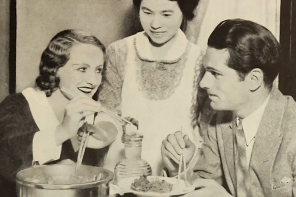I grew up with hippie parents. They built a house (themselves, of course) in Woodstock, New York, practiced Buddhism, and were intent on making sure that I didn’t buy into gender stereotypes. For every doll, I also had a truck. For every tea set, I got a sword.
My father, in particular, took an interest in ensuring I was as well-rounded as possible. He bought me chemistry sets and explained atoms to me. When I complained that I was too little to do anything, we built a robot together. Yes, a robot.
As I watched Virgin Tales, a Swiss documentary about purity balls—dances where young girls pledge their virginities to their dads—I thought of my father often. Because the most compelling focus of the film wasn’t the events themselves, but the way in which one family’s dynamic can reveal so much about American culture and politics.
Filmmaker Mirjam von Arx follows the Colorado Springs-based Wilson family whose patriarch, Randy, invented purity balls. Von Arx focuses on one daughter in particular, Jordyn. (The Wilsons have five daughter and two sons.) Jordyn is college-aged but not in college. “I want to be a wife and a mother,” she says, “I would hate to go off and spend thousands of dollars on an education that I wouldn’t use.” She’s also the only one of the older three sisters who isn’t married—a fact that dominates her thoughts, given she believes the most important role she could have is that of a wife. There are often shots of Jordyn wistfully looking off into the distance, watching her married sisters’ wedding videos or staring at her doted-on sister Khrystian who plays guitar and always has perfectly coiffed hair.
Still, Jordyn says she’s happy being a dutiful daughter until she meets her future husband. “I am content here and I feel safe here,” she says.
While other dads may have been teaching their daughters soccer, Randy was making sure that his little girls were focused on traditional feminine pursuits. Jordyn runs “the School of Grace” out of their home, where she gives advice to other young women on how to be properly ladylike. (She uses a book on etiquette from the 1920s to demonstrate how to modestly bend over at a water fountain, or how to greet people with a smile when they come into your home.)
His wife, Lisa, homeschooled their children and the “curriculum” speaks volumes. Daughter Kaalyn reads from an illustrated book: “Because you are my chosen princess you should dress modestly every day.”
“Sadly, there are a lot of girls that don’t think about me when they get dressed in the morning. They wear clothes that do not cover their bodies or that show their bodies in an immodest way. Keep your body covered and be my model.”
Later we see Randy building a hope chest for his daughter Kameryn that will be revealed at a ceremony held in the family living room. There, Kameryn is given her great-great-grandmother’s wedding ring as a purity ring and is taught about “fruitfulness.”
A family friend reads from a prepared speech, telling her, “If and when God brings that Godly man into your life and opens your womb, becoming a mother will be one of the most profound and significant things you ever do.”
“Biblical fruitfulness is the opposite of what today’s culture promotes. Our culture actually celebrates barrenness.”
Even to the women who marry into the Wilson family, their roles are clear. Colton Wilson’s wife Anna tells us, “Because I love God I love my husband, regardless of whether or not I have feelings of affection for him in a given moment.”
“The command to love him is just that—it’s a command.”
As a feminist, I found the purity balls themselves the most difficult to watch. Young women and girls are dressed in ballgowns, their hair professionally done. They pose with their fathers under white arches decorated with flowers, like prom dates. And the midst of all this revelry, they promise to remain virgins and their fathers, in turn, pledge to be the protector of that “purity.” Some are given rings—it reminds me of a wedding ceremony.
I asked my father to watch a video clip of the balls a few years ago; I was fascinated with them. At the time, I was concerned that I was overreacting (perhaps I was just a jaded feminist?), so I figured who better to ask than my dad. He made it through two minutes.
My father was visibly upset for some time afterward. He told me how difficult it was, as a dad, to make sure that you were respectful of your daughters as they grew up, especially in areas concerning sexuality. Seeing those lines very deliberately crossed—and with such pomp and circumstance!—made him feel a bit queasy.
Even now, after having written a book on purity culture and politics and having had met Randy in a truly bizarre interaction on a daytime talk show (don’t ask), they still affect me on a visceral level. The Wilsons claim to be offering an antidote to the hypersexualized pop culture that targets young women—but by defining girls so concretely by their virginity, they’re ensuring that young women will continue to be judged by what they do or don’t do sexually. The women who take virginity pledges and go to purity balls are promising that their bodies aren’t their own, but instead belong to their fathers and future husbands.
But despite the radical evangelicalism and sexism the Wilsons promote, as I watched the film I found it difficult not to root for Jordyn. Here’s a young woman—a bit awkward, and a lot unworldly—who just wants to be loved. She wants a happy life, a family, and to please her parents. And she wants it desperately. The boundaries of her goals may be more narrow than most women’s, but that kind of youthful desire and uncertainty are universal experiences.
That’s why purity balls are so effective, not just because they rely on religious and cultural indoctrination—that would be too easy. Purity balls sell young women the idea of love. This is how your father will love you. This is the way to get a man who will love you and is worthy of your love. This is how you get God’s love. It’s a powerful message, one that resonates because it promises what we all want: an amazing love story.
The problem, of course, is that it’s not really about love. Sitting outside of a purity ball, in black-tie attire, Lisa tears up as she explains the events aren’t just about the party.
“It’s a beautiful moment with their father to say, ‘I care enough about you to invest in an expensive hotel and expensive meal and a lovely dress for you.’ To say that you’re valued.”
Women know the ways in which they’re valued. Whether we go to purity balls or rock concerts as young women, the limits of our worth in American culture are as subtle as a kick to the head. My hope is that not all of us will believe it, that we will want more for ourselves than subjugation dressed up in ballgowns (or bikinis). Until then, I hope we can find happiness and our own love stories. When I finished Virgin Tales, I searched for Jordyn online. She got married this year. I was happy for her.




